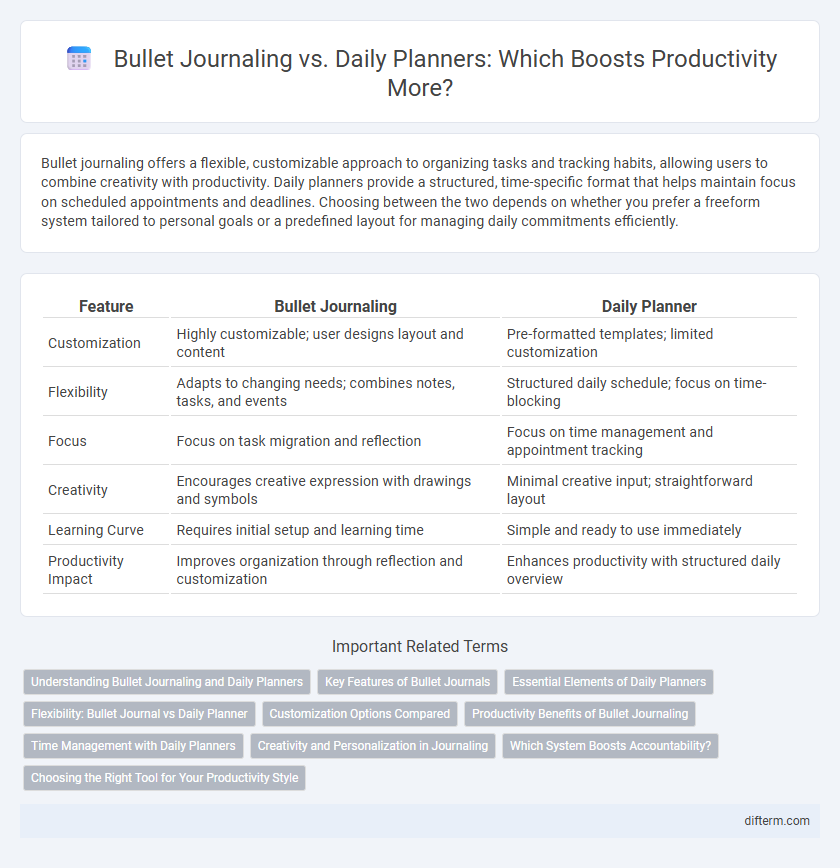Bullet journaling offers a flexible, customizable approach to organizing tasks and tracking habits, allowing users to combine creativity with productivity. Daily planners provide a structured, time-specific format that helps maintain focus on scheduled appointments and deadlines. Choosing between the two depends on whether you prefer a freeform system tailored to personal goals or a predefined layout for managing daily commitments efficiently.
Table of Comparison
| Feature | Bullet Journaling | Daily Planner |
|---|---|---|
| Customization | Highly customizable; user designs layout and content | Pre-formatted templates; limited customization |
| Flexibility | Adapts to changing needs; combines notes, tasks, and events | Structured daily schedule; focus on time-blocking |
| Focus | Focus on task migration and reflection | Focus on time management and appointment tracking |
| Creativity | Encourages creative expression with drawings and symbols | Minimal creative input; straightforward layout |
| Learning Curve | Requires initial setup and learning time | Simple and ready to use immediately |
| Productivity Impact | Improves organization through reflection and customization | Enhances productivity with structured daily overview |
Understanding Bullet Journaling and Daily Planners
Bullet journaling offers a flexible, customizable method for tracking tasks, events, and goals using a combination of symbols and indexing, promoting mindfulness and creativity. In contrast, daily planners provide structured formats with pre-designed layouts that streamline scheduling and time management for high efficiency. Both tools enhance productivity by catering to different organizational preferences and cognitive styles.
Key Features of Bullet Journals
Bullet journaling offers unmatched customization with its flexible layouts, enabling users to merge task lists, calendars, and habit trackers in one cohesive system. Its modular design supports rapid logging through bullets, symbols, and indexing, enhancing task prioritization and day-to-day adaptability. Unlike traditional daily planners, bullet journals foster creativity and mindfulness, making them ideal for personalized productivity and long-term goal tracking.
Essential Elements of Daily Planners
Daily planners emphasize structured time management with dedicated sections for schedules, to-do lists, and priority tasks, enabling efficient day-to-day organization. Essential elements include hourly time slots, goal tracking, and habit monitoring, which support targeted productivity improvements. This structured format contrasts with bullet journaling's flexible approach, making daily planners ideal for users who prefer clear, consistent frameworks to maximize efficiency.
Flexibility: Bullet Journal vs Daily Planner
Bullet Journaling offers unmatched flexibility by allowing users to customize layouts, track diverse tasks, and adapt pages to changing priorities, making it ideal for creative productivity. Daily planners provide structured templates that streamline scheduling and task management but limit personalization to predefined formats. Choosing between the two depends on whether dynamic customization or consistent organization drives your productivity success.
Customization Options Compared
Bullet journaling offers unparalleled customization, enabling users to design layouts, trackers, and logs tailored to their unique productivity needs, unlike daily planners that typically provide fixed formats and pre-structured pages. The flexibility of bullet journals supports creative expression and adaptability, allowing for seamless integration of habit tracking, goal setting, and brainstorming in one personalized system. Conversely, daily planners prioritize convenience and time management with pre-determined schedules and sections but lack the dynamic customization that enhances individual productivity workflows in bullet journaling.
Productivity Benefits of Bullet Journaling
Bullet journaling enhances productivity by offering customizable organization tailored to individual workflow, unlike rigid daily planners with fixed layouts. Its flexibility supports rapid logging, task prioritization, and habit tracking, boosting focus and time management. Moreover, bullet journals promote mindfulness and reflection, which improve goal setting and sustained motivation.
Time Management with Daily Planners
Daily planners enhance time management by offering structured layouts that prioritize tasks, appointments, and deadlines efficiently. They facilitate consistent scheduling and time blocking, which helps reduce procrastination and improve focus on daily goals. Unlike bullet journaling, daily planners provide predefined formats that streamline organization and promote disciplined time tracking.
Creativity and Personalization in Journaling
Bullet journaling enhances creativity by allowing users to customize layouts, incorporate artistic elements, and tailor symbols to personal preferences, fostering a unique productivity system. Daily planners offer structured formats with predefined sections, limiting personalization but providing consistency and ease of use for routine task management. The flexibility of bullet journaling supports individual expression and adaptive planning, making it ideal for those seeking a creative, customizable organizational tool.
Which System Boosts Accountability?
Bullet journaling enhances accountability by combining customizable task tracking with reflective logging, allowing for personalized progress assessment and goal adjustments. Daily planners offer structured layouts and pre-set time blocks, promoting consistent scheduling and timely task completion. Studies indicate that bullet journaling's flexible approach fosters deeper self-awareness, while daily planners drive routine adherence, making the choice dependent on individual accountability preferences.
Choosing the Right Tool for Your Productivity Style
Bullet journaling offers a flexible, customizable approach ideal for creative thinkers who prefer combining planning with reflection and goal tracking. Daily planners provide structured layouts that suit individuals seeking clear, time-blocked schedules and straightforward task management. Understanding your productivity style -- whether you thrive on adaptability or prefer regimented organization -- is crucial for selecting the tool that maximizes your efficiency.
Bullet Journaling vs Daily Planner Infographic

 difterm.com
difterm.com